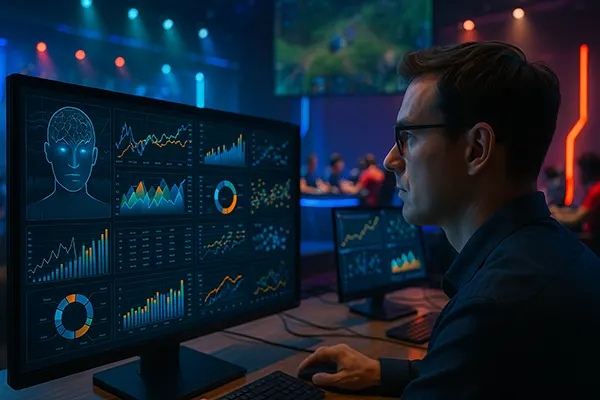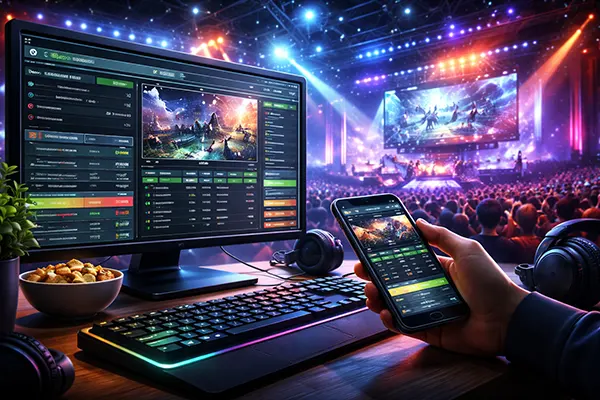The Impact of AI and Machine Learning on Esports Odds Setting

Artificial intelligence and machine learning have redefined the way betting odds are calculated in esports. With the growing popularity of competitive gaming and vast data availability, bookmakers and analytics firms are using these technologies to achieve greater accuracy, speed, and fairness in odds formation. As of 2025, AI-driven systems dominate the esports betting landscape, combining real-time analysis with predictive insights.
How AI Transforms Esports Betting Odds
Artificial intelligence has revolutionised odds setting by processing millions of variables in real time. Instead of relying solely on human analysts, AI models evaluate player performance, team dynamics, match statistics, and even in-game behaviour. This level of analysis allows bookmakers to generate highly dynamic odds that adjust as matches progress, reflecting the real probability of outcomes.
One of the most notable advances in 2025 is the integration of neural networks trained on historical esports data. These models continuously learn from past tournaments and recent gameplay to recognise hidden patterns in player behaviour and team synergy. As a result, the odds are no longer static but evolve with every movement within the game.
Furthermore, AI eliminates emotional and cognitive biases that human traders might have. By basing calculations purely on quantitative input, the system ensures objective and consistent pricing across multiple esports disciplines such as League of Legends, Counter-Strike 2, and Dota 2.
Machine Learning Models Behind Modern Esports Analytics
Machine learning models are at the core of automated odds prediction. Algorithms such as gradient boosting, deep reinforcement learning, and ensemble methods are used to evaluate both macro and micro-level performance data. They detect trends invisible to the human eye, such as player reaction times, map control tendencies, and psychological responses under pressure.
In 2025, predictive systems also incorporate real-time telemetry data from game servers. This allows odds to fluctuate instantly when key events occur, like early kills, tower losses, or tactical pauses. The speed of data processing is critical for live betting, where milliseconds can change the market.
These innovations have also led to greater transparency. Some licensed operators now share the models’ logic and historical performance to ensure users can trust the statistical foundation of odds generation.
Ethical and Regulatory Considerations in AI-Based Odds Setting
The use of AI in esports betting introduces ethical challenges. While algorithms improve accuracy, they can also create dependencies on data access and algorithmic control. Regulators in 2025 have begun enforcing transparency rules that require operators to disclose how AI models influence odds formation.
Moreover, there are concerns about fairness. If AI systems rely on biased or incomplete data, they can unintentionally produce skewed odds that disadvantage certain teams or players. To address this, independent audits and data integrity checks have become a standard part of esports regulation frameworks worldwide.
Another issue is user protection. As AI models predict betting behaviour, there is a fine line between personalisation and manipulation. Regulators now demand that all AI-based betting systems include safeguards against exploitation, ensuring responsible and ethical use of data analytics.
Transparency and Accountability of Algorithms
Transparency has become a cornerstone of AI adoption in esports betting. Modern systems are expected to document every decision path within their algorithms. This means that when an odd changes, there must be a traceable reason linked to data input, not arbitrary market manipulation.
Independent verification agencies have emerged to certify AI fairness and accountability. These agencies evaluate whether an operator’s machine learning system complies with responsible gambling standards and ensures equal treatment of all players.
In addition, some bookmakers now offer public reports explaining how AI contributes to odds updates. This practice fosters trust between users, regulators, and operators, creating a more open and fair betting ecosystem.

The Future of AI-Driven Esports Betting
The future of AI in esports betting promises even deeper integration with advanced analytics and blockchain verification. By 2025, machine learning systems are expected to cooperate with decentralised ledgers to ensure transparent, tamper-proof odds generation and data tracking.
Predictive algorithms will evolve to include emotional and behavioural data, analysing how players’ psychological states impact match outcomes. These models will not replace human expertise but will serve as decision-support systems, helping traders refine their odds based on both data and intuition.
Finally, AI-driven automation will continue to reshape user experiences. Bettors will receive personalised insights, real-time match analysis, and predictive outcome visualisations, allowing them to make more informed and responsible decisions when engaging with esports betting markets.
Integration of AI with Emerging Technologies
AI is set to work in synergy with other technological advancements such as virtual reality, blockchain, and biometric data collection. These integrations will not only enhance predictive accuracy but also bring more integrity to betting ecosystems through verified data sources.
Blockchain, in particular, ensures that every AI-generated odds adjustment is verifiable and immutable, preventing fraud and data tampering. Meanwhile, VR-based esports viewing experiences will incorporate live odds overlays powered by AI, making engagement more interactive and data-rich.
As these technologies converge, the line between esports analytics and entertainment will blur, creating a fully data-driven ecosystem where information, trust, and transparency define the future of competitive gaming betting.




